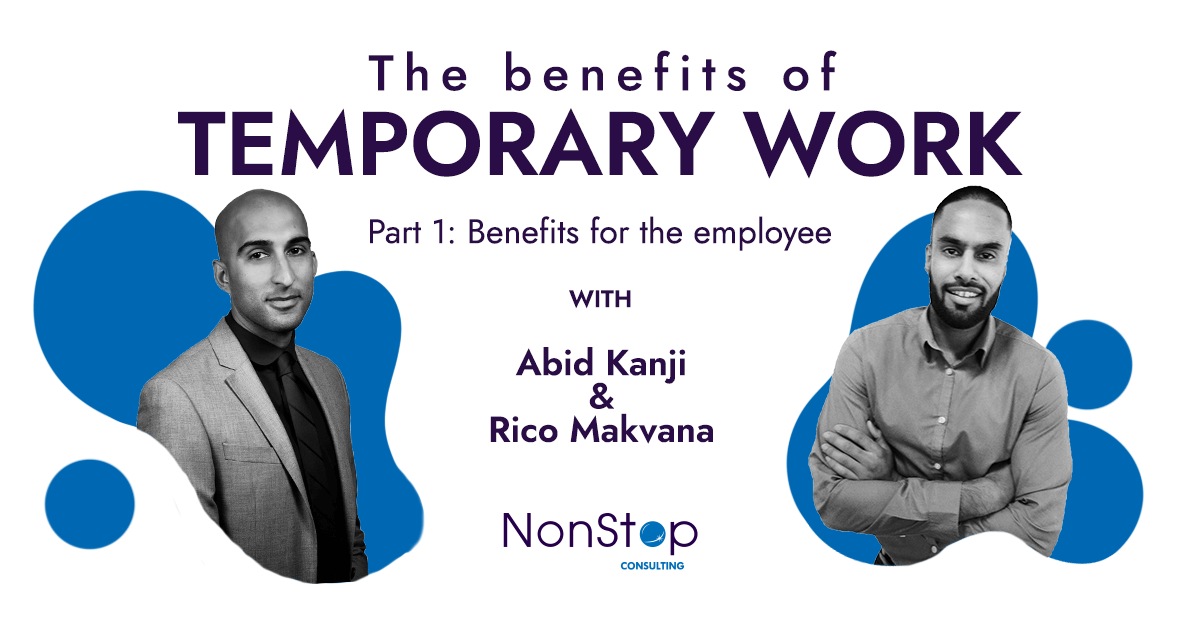Temporary or contract work has many benefits both employers and employees. For employers, it provides flexibility in managing workforce fluctuations, access to specialised skills, and a trial period to assess potential hires.
For employees on the other hand, temporary work offers flexibility in work schedule and duration, opportunities for gaining diverse experience and skill enhancement, and quick employment options while maintaining professional growth.
In this two-part series, we will lean on the experiences of two of our most senior contract recruiters, Rico Makvana and Abid Kanji, to explore the benefits for both sides of the employment relationship.
Part one: The employee
Temporary or contract work offers employees great flexibility, providing the ability to choose assignments that suit their preferences and availability, according to Rico, a business unit manager in our UK social care division.
Given that flexibility, this style of working provides opportunities for gaining a variety of experience across industries and projects, fostering skill development and marketability, and building industry networks.
According to Abid, a director and headhunter in our European chemical division, temporary or contract work also allows for quick employment, enabling individuals to secure income promptly while maintaining professional momentum.
In this part of the article, we’re going to explore the main benefits temporary or contract work can offer an employee.
Flexibility
Temporary and contract jobs provide greater flexibility in terms of work schedule and duration as workers can choose assignments that align with their personal preferences and availability.
“For example, someone who enjoys working on different projects could take a series of short-term freelance contracts focused on different areas of their niche, giving variety to their work,” Rico says.
Someone who has specific family or other time-specific commitments, meanwhile, could choose contracts based on the hours offered, rather than being tied to a traditional nine-to-five corporate role, he adds.
Variety of Experience
Contract and temporary roles often expose job seekers to a wide range of industries, companies, and projects. According to Abid, this allows individuals to develop diverse skill sets and gain valuable experience across different sectors, which can be particularly useful for more junior people wanting to build up a CV.
“For example, a recent graduate still unsure of the exact area they want to specialise in could take a series of short-term contracts to both build up experience and see which area suits them best,” he says.
This is also a good way to see what it’s like working in different kinds of companies as the experience and working style can differ greatly between small start-ups through to multinational corporates.
Networking Opportunities
Temporary positions enable individuals to expand their professional networks by working with various employers and colleagues, Rico says.
With each contract or assignment taken, there are many more people from a variety of backgrounds working in a variety of roles to meet and collaborate with.
“These connections can lead to future job opportunities, referrals, industry insights, and mentorship opportunities,” he adds.
Quick Employment
According to Abid, temporary jobs can offer a relatively fast route to employment. Since these roles are often filled quickly to meet immediate needs, job seekers can find work and start earning income without a lengthy application process.
For people who have suddenly found themselves out of work, maybe just moved to a new city, or just graduated, temporary roles can be a great route to long-term employment too if that is the ultimate goal as many companies offer a temp-to-perm option for employees that prove themselves.
Skill Enhancement
Temporary roles can provide an opportunity to develop and enhance specific skills. Job seekers can gain valuable on-the-job training and acquire new abilities that make them more marketable in the long run, according to Rico.
“For example, a recent graduate can take a temporary junior role but benefit from exposure to a range of senior people and learn from them. When that contract finishes, they can search for another that would allow them to learn a different skillset, therefore building up a wide range of practical skills and industry-relevant experience”, he says.
After several such contracts, that person could have built up enough practical experience to start pitching themselves for more mid-level roles, potentially progressing their career faster than peers in long-term employment.
While the benefits of temporary or contract work are clear, it’s also important to note that income isn’t always as guaranteed as those working permanent roles. This is due to the fact a temporary worker, particularly someone on a short-term contract, will always need to be looking for their next opportunity and, if income is of concern, try to align the start of the new contract with the end of the previous one.
Benefits offered to temporary workers, particularly those on short-term contracts, can differ to those offered to permanent employees too.
For anyone working in temporary roles, or considering it, we would always recommend working with a specialist recruitment consultant to help find new roles and ease the administrative burden.
For anyone looking for temporary work right now, view all our opportunities here, or contact our team for advice here.





